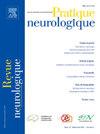Vers un traitement neuroprotecteur dans la maladie de Parkinson ? La « cible alphasynucléine »
Q4 Medicine
引用次数: 0
Abstract
Depuis la fin des années 1990, de nombreuses études ont suggéré l’implication de l’accumulation cérébrale anormale de l’alphasynucléine dans le processus dégénératif de la maladie de Parkinson. L’immunothérapie anti-alphasynucléine apparaît donc une piste attractive pour réduire cette accumulation et ainsi freiner la progression de la maladie. À ce jour, les essais thérapeutiques basés sur cette approche sont négatifs. Des résultats encourageants ont toutefois été obtenus avec le prasinézumab, un anticorps monoclonal anti-alphasynucléine. Est-ce un réel espoir de traitement neuroprotecteur dans la maladie ou la simple illusion d’une hypothèse pathogénique un peu trop séduisante ?
Since the late 1990s, numerous studies have suggested the involvement of abnormal cerebral accumulation of alphasynuclein in the degenerative process of Parkinson's disease. Anti-alphasynuclein immunotherapy therefore appears to be an attractive way to reduce this accumulation and thus slow the progression of the disease. To date, drug trials based on this approach have been negative. However, encouraging results have been obtained with prazinezumab, a monoclonal anti-alphasynuclein antibody. Is this a real hope for a neuroprotective treatment in the disease, or merely the illusion of an overly appealing pathogenic hypothesis?
帕金森氏症的神经保护疗法?“α -核酸靶标”
自20世纪90年代末以来,许多研究表明,大脑中α -核苷的异常积累与帕金森氏症的退行性过程有关。因此,抗α -糖苷免疫疗法似乎是一种有吸引力的方法来减少这种积累,从而减缓疾病的进展。到目前为止,基于这种方法的治疗试验是阴性的。然而,单克隆抗α核素抗体prasinezumab取得了令人鼓舞的结果。自20世纪90年代末以来,大量的研究表明,α -丝氨酸在大脑中的异常积累与帕金森氏症的退行性过程有关。因此,抗α - synuclein免疫疗法似乎是一种有吸引力的方法来减少这种积累,从而减缓疾病的进展。到目前为止,基于这种方法的药物试验是阴性的。然而,单克隆抗α - synuclein抗体prazinezumab取得了令人鼓舞的结果。这是神经保护性治疗这种疾病的真正希望,还是仅仅是一种普遍吸引力的致病性假设的幻觉?
本文章由计算机程序翻译,如有差异,请以英文原文为准。
求助全文
约1分钟内获得全文
求助全文

 求助内容:
求助内容: 应助结果提醒方式:
应助结果提醒方式:


